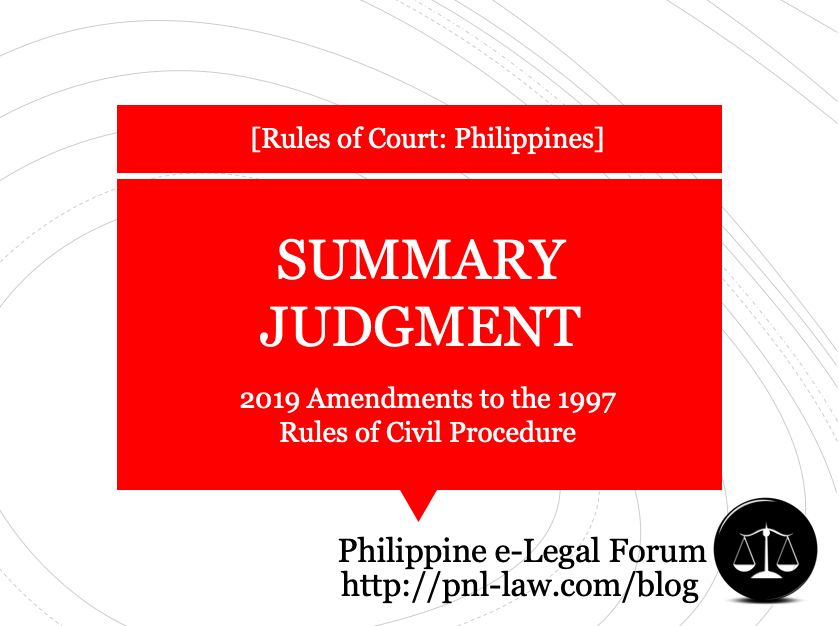The 2019 Proposed Amendments to the 1997 Rules of Civil Procedure (hereinafter, “2019 Amendments”), which takes effect on 1 May 2020, retains most of the provisions of Rule 35 (“Summary Judgments”). The provisions on summary judgements, including the amendments, are discussed below. [The summary/discussion of other Rules may be tracked through the Menu.]

Summary judgment may be resorted to by either the claimant or the defending party. [For the proper distinction between summary judgment and judgment on the pleadings, see the separate post on Judgement on the Pleadings.]
I. SUMMARY JUDGMENT FOR THE CLAIMANT
A party seeking to recover upon a claim, counterclaim, or cross-claim or to obtain a declaratory relief may, at any time after the pleading in answer thereto has been served, move with supporting affidavits, depositions or admissions for a summary judgment in his or her favor upon all or any part thereof.
II. SUMMARY JUDGMENT FOR THE DEFENDING PARTY
A party against whom a claim, counterclaim, or cross-claim is asserted or a declaratory relief is sought may, at any time, move with supporting affidavits, depositions or admissions for a summary judgment in his or her favor as to all or any part thereof.
III. MOTION AND PROCEEDINGS THEREON
In both the 1997 Rules and the 2019 Amendments, judgment sought shall be rendered forthwith if the pleadings, supporting affidavits, depositions and admissions on file, show that, except as to the amount of damages, there is no genuine issue as to any material fact and that the moving party is entitled to judgment as a matter of law. However, under the 2019 Amendments, the court has discretion not to conduct a hearing on the motion. [See Rules on Motions]
The phrase “genuine issue,” which is not defined or characterized in the 2019 Amendments, means an issue of fact which calls for the presentation of evidence, as distinguished from an issue which is fictitious or contrived, an issue that does not constitute a genuine issue for trial (Wood Technology Corp. vs. Equitable Banking Corp., G.R. No. 153867, 17 February 2005).
The old 1997 Rules provides that “[t]he motion shall be served at least ten (10) days before the time specified for the hearing. The adverse party may serve opposing affidavits, depositions, or admissions at least three (3) days before the hearing.” The following changes have been introduced under the 2019 Amendments:
- The motion shall cite the supporting affidavits, depositions or admissions, and the specific law relied upon.
- The adverse party’s period to comment and serve opposing documents (affidavits, depositions, or admissions) has been extended to 5 calendar days from receipt of the motion for summary judgment. The 5-day period, however, is non-extendible.
- The requirement for a 10-day prior notice has been removed, as hearings are now discretionary even for litigious motions. [See Rules on Motions]
The 2019 Amendments now expressly provides that any action of the court on a motion for summary judgment shall not be subject of an appeal or petition for certiorari, prohibition or mandamus.
We note that the propriety of rendering a summary judgment is one of the matters which must be considered by the court during the pre-trial conference. The court may, after the pre-trial conference, motu proprio issue an order submitting the case for summary judgment. [See Pre-Trial Conference]
IV. CASES NOT FULLY ADJUDICATED ON MOTION
Both the 1997 Rules and the 2019 Amendments provide that if, on motion under Rule 35, judgment is not rendered upon the whole case or for all the reliefs sought and a trial is necessary, the court may, by examining the pleadings and the evidence before it and by interrogating counsel, ascertain what material facts exist without substantial controversy.
The facts so ascertained shall be deemed established, and the trial shall be conducted on the controverted facts accordingly. [The 1997 Rules uses the term “specified,” which has been changed to “ascertained” under the 2019 Amendments.]
The 2019 Amendments now provides that in addition to the ascertainment of material facts without substantial controversy, the court may also ascertain the extent to which the amount of damages or other relief is not in controversy, and direct such further proceedings in the action as are just.
V. FORM OF AFFIDAVITS AND SUPPORTING PAPERS
The 2019 Amendments retains the provision in the 1997 Rules that supporting and opposing affidavits shall be made on personal knowledge, shall set forth such facts as would be admissible in evidence, and shall show affirmatively that the affiant is competent to testify to the matters stated therein. Certified true copies of all papers or parts thereof referred to in the affidavit shall be attached thereto or served therewith.
VI. AFFIDAVITS IN BAD FAITH
The 2019 Amendments also retains the provision in the 1997 Rules that should it appear to its satisfaction at any time that any of the affidavits presented are presented in bad faith, or solely for the purpose of delay, the court shall forthwith order the offending party or counsel to pay to the other party the amount of the reasonable expenses which the filing of the affidavits caused him or her to incur, including attorney’s fees, it may, after hearing further adjudge the offending party or counsel guilty of contempt.
